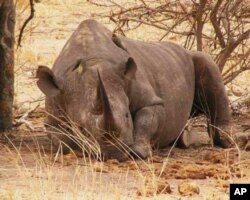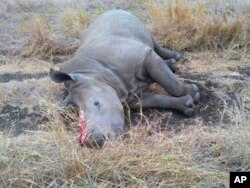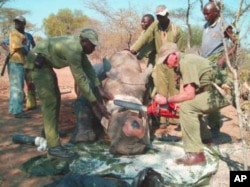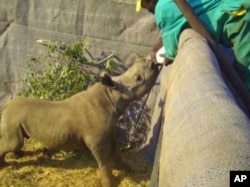As the killing by poachers of South Africa’s endangered rhinos continues unabated, conservationists are debating possible strategies to ease the crisis.
According to the country’s environmental department, criminals have slaughtered more than 1,000 of the animals in the past five years. In 2011 alone, they killed almost 450.
Only about 20,000 survive in South Africa, mostly in state and private wildlife reserves.
Organizations trying to save them say criminal syndicates are behind the poaching. Rhino horn fetches high prices on the black market. Some people in Asia, most notably in Vietnam, believe that, when ground and ingested, it cures cancer.
Poachers either kill the rhinos with high caliber rifles, or they dart them with veterinary drugs to sedate them. They then use chainsaws to remove the animals’ horns, leaving them to bleed to death.
Ranchers call for legalization
Many ranchers who’ve lost rhinos to poachers are calling for international trade in horns to be legalized, so that it can be controlled by the relevant authorities. If this happens, they argue, the crime syndicates’ black market will be shut down and poaching will cease.
“Because the demand seems to be so huge, legalizing the trade of rhino horn is looking almost the obvious choice to make,” said wildlife park owner Iain Stewart.
Another rhino owner, Angus Sholto-Douglas, echoed Stewart and added that South Africa should be allowed to sell its existing stock of horns. He said the state authorities and others are storing an “enormous” number of horns taken from animals that died naturally.
“We should do a formal audit of that stock then possibly look at selling 10 to 15 percent of that into the market, to get an idea of how quickly that is sold,” said Sholto-Douglas. “Then we’ll have an idea of how big the demand is, and that will allow us to make an informed decision about whether or not to press ahead with legalization of the trade.”
Game reserve manager Alan Weyer has ideas similar to those of Sholto-Douglas. “In the natural course of events, rhinos die, from things like old age and fighting with one another. And they leave their horns. Those horns are in stockpile at the moment because nobody can do anything (legal) with them. There’s a huge value to the horn – but it’s exclusive to the rhino poachers,” Weyer said.
As long as the only way to make money from rhino horns is poaching and taking the horns to the black market, he added, crime syndicates will continue to kill the animals. “That’s logical. It’s ironic that something designed to protect rhino – making horn trade illegal – is actually also driving the poaching,” he stated.
Weyer suggested South Africa should be allowed to release its stockpile “in a controlled manner” onto the market in Asia. He’s convinced this will bring the price of rhino horn down and “take the (criminals’) profit incentive out of it. I believe it’s the one way that we can control poaching.”
Dangerous gamble
Tom Milliken, an expert in the international trade in wildlife products, has intensively researched the possibility of legalizing sales of horns for Traffic International.
He warned that the relevant authorities should “exercise extreme caution in moving forward with any notion of a legalized trade. It’s very unclear exactly what the actual size of demand is for rhino horn. If the demand is too big, then a legal trade won’t stop the poaching.”
He said a legal trade, rather than lessening killings, may well encourage further poaching. Milliken added, “We don’t have the ability to run an experiment here and if we fail, we’re probably failing by wiping out all of the remaining rhinos.”
Internationally respected wildlife veterinarian Jacques Flamand said it would be a dangerous gamble to release rhino horns in an attempt to flood the market and bring high prices down in order to make the illegal trade less lucrative for the criminals.
“We don’t know what effect that would have. Would it meet the demand? If it doesn’t meet the demand, we’ll still be in the same position. If it does meet the demand and it brings the rhino horn price down, then it might work. But there are so many unknowns. It is risky; we just don’t know the answer,” said Flamand.
Market is ‘too huge’
Lucy Boddam-Whetham, deputy director of Save the Rhino International, said “on paper,” legalization of the rhino horn trade looks as if it could possibly solve the problem of poaching. But in reality, she said, it wouldn’t be the best course of action at the moment.
“We just don’t understand the scale of demand at the moment and it’ll be incredibly difficult to police the trade even if it is legal -- it’ll be very difficult to control which rhino horns are legal and which are not. And we don’t know at this stage whether the Asian countries involved would want a legalized trade,” she said.
Boddam-Whetham suggested that the illicit trade in horns needs to be controlled before any further thought is given to legalizing the sale of horn. “There just might not be enough rhino horns available to stem the demand. It’s something that needs further investigation.”
South African zoologist Jennifer Gush, who works a lot with rhinos, also cautioned against any “dangerous experiments” with regard to trade in horn. “It’s tempting to join the cry to legalize the trade and to just release as much as possible of the stockpile to bring the price down – especially because we could then use the finance generated to protect rhino,” she said, and added, “I think the market is too huge to flood.… Even if every reserve in the country cut their rhino horn off and sold it and did that on a yearly basis, I don’t think we’d be able to flood the market and bring the price down. There’d still be a big enough black market demand for it.”
Flamand said wildlife veterinarians are able to tranquillize rhinos and remove safe amounts of their horns with saws. When done properly, the procedure does not harm the animals.
‘No silver bullet’
Boddam-Whetham said her organization is concerned that “if you flood the market, then more people become interested in rhino horns and demand increases.” She added, “There’ve been studies to show that when elephant tusks have been sold (legally), there’s been a spike in elephant poaching.”
Milliken said, “Obviously rhinos are found in other countries as well, and allowing a legal rhino horn trade could produce unintended consequences for those countries. So I think if there’s going to be any move in the direction of a legal trade, it should encompass the input of all states in both Africa and Asia that have rhino.”
He said there were “huge hurdles to get over. There’s no silver bullet; there’s no quick solution. We have to exercise a lot of caution if we move down this path towards legalization.”
Milliken pointed out that none of the Asian countries where horn is sold illegally have approached South Africa to explore the possibility of cooperating with it to establish legal trading. He asked, “How do you go about constructing a legal trade if you don’t have a partner in the consuming part of the world?”
Poachers will be defeated
Despite the fact that the debate is “throwing up more questions than answers,” according to Boddam-Whetham, she insists the conservationists will eventually triumph over the poachers and the criminal syndicates behind the butchering of rhinos.
The seeds of her confidence lie in the past.“I absolutely believe 100 percent that we can stop the poaching. We’ve done it before, when rhinos were down to 50 to 100 animals in the late 1800s. We stopped the poachers of the late 1980s and early 1990s,” Boddam-Whetham said.
She added, “As long as we keep fighting from all corners, we will win. And we must realize that this fight isn’t just about the rhino. If we lose the rhino war, then the poachers will increasingly target tigers and elephants and all the other animals being affected by the illegal wildlife trade. We have to set an example and keep fighting and not give up and I really truly believe that we can win if we all cooperate and not let up.”








